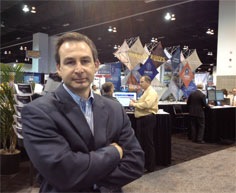Interview: At the center of the IT revolution
Mike Mestrovich is DIA's senior technology officer for solutions in the information management directorate. Think of him as the agency's advanced IT guru. In past lives, he's helped build nuclear targeting tools for the Air Force and worked on government networks for Cisco. Depending how things go, the highlight of his career could be the role he was assigned earlier this year as chief architect for a key element of the intelligence community's IT efficiency drive. Mestrovich leads the team that's designing a common desktop computing environment for workers across the agencies. He spoke to Ben Iannotta about the desktop, the apps craze and the feasibility of going mobile.
Read excerpts below >>
 Intelligence Community Information Technology Enterprise (ICITE, pronounced eyesight)>> It'll create "a common desktop to all IC members, such that any IC person could go to any IC desktop, log in and have access to their emails, their files, their sharePoints, all of that stuff…It's certainly a consolidation event and an efficiencies event and something that's never been done before. It's a huge deal. It's a big game changer for the intelligence community."
Intelligence Community Information Technology Enterprise (ICITE, pronounced eyesight)>> It'll create "a common desktop to all IC members, such that any IC person could go to any IC desktop, log in and have access to their emails, their files, their sharePoints, all of that stuff…It's certainly a consolidation event and an efficiencies event and something that's never been done before. It's a huge deal. It's a big game changer for the intelligence community."
ICITE schedule >> "There's tens of thousands of people in the intelligence community … the expectation is that on -- around the 31st of [March] next near – indeed some of those people, the early adopters if you will, will have a common desktop…"
FBI, Treasury, DEA too?>> "All of those are scheduled to be included in the ICITE activity. There's a phased implementation and we're right now looking at when do we start bringing in those other agencies."
Latest on ICITE >> "NSA and CIA were designated as the cloud service providers. DIA and NGA jointly were designated as the desktop service provider. There was an Applications Mall service provider, and then individual app stores would be delivered by individual agencies. We've just gone through some design reviews for that… And we're now in effectively the implementation phase of that…"
Real world mobility >> "It's one thing to be sitting hopefully with nobody around you, reading secret emails…It would be a totally different thing to be actually having an open, verbal classified conversation….the capabilities certainly continue to advance and give us the opportunity to do that. You just have to be cautious of, you know, when is the most appropriate time to engage in that activity?"
Connected in your SCIF (sensitive compartmented information facility) >> "Inside the classified space, we certainly want to enable people to have more mobility than they had. So, ideally, we'd love to have the environment where you do pick up your laptop and go to the meeting room and your laptop is capable of connecting wirelessly and processing TS information. That is something we are striving towards. Lot of work to do in that space, but it's something we're going towards."
Apps Mall >> "There's lots of operational activity behind that. How do I know that you as a person have the need to know?....How are you trained to run the application? There's a lot of different operational components behind it, but natively what was understood was there would be kind of a central repository where all the analysts could go, much like you do with your iPhone or Android device today. You get an opportunity to search and see all the apps that are out there. And maybe you discover that there's some new ones and you try them out and you find that they do have some applicability…"
Evolution >> Historically, the director for information management had what they called senior account managers….The process has evolved a little bit…We have something where the customers actually get together amongst themselves in the functional disciplines, and they themselves kind of vet out requirements. We don't get effectively conflicting requirements, or diametrically opposed requirements - You know, PaCom wants you to do X, and EuCom wants you to do Y, and X and Y are totally incompatible with one another."


